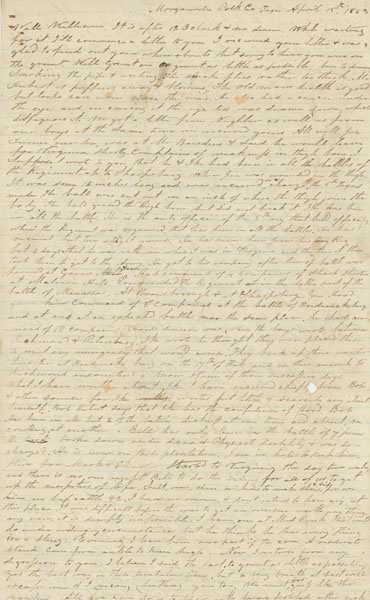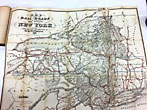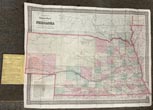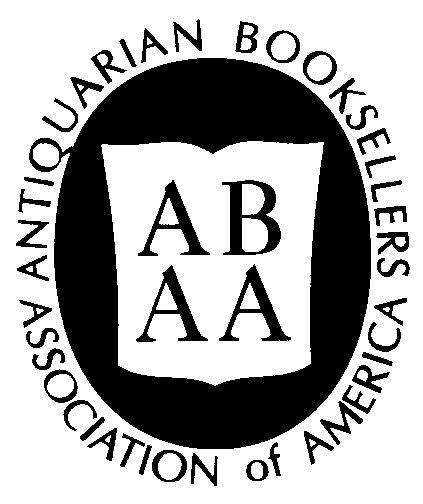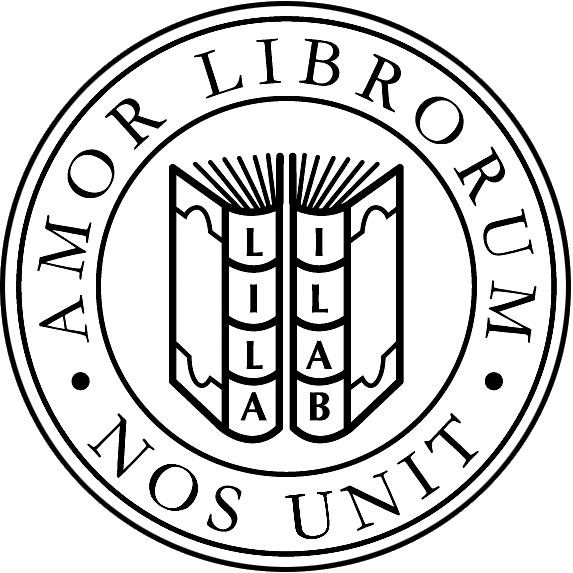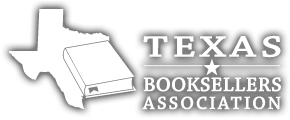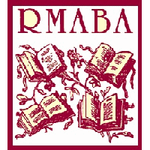Dealer in Rare and First-Edition Books: Western Americana; Mystery, Detective, and Espionage Fiction
Holograph Letter Signed By Joseph A. S. Turner, Father Of Capt. Isaac Turner, 5th Texas Infantry (Hood's Brigade), Discussing The Causes And Consequences Of The Civil War
JOSEPH A. S. TURNER
Other works by JOSEPH A. S. TURNERPublication: Written by Joseph A S Turner, April 15-27, 1863, Morganville, Polk County, Texas
Four pages, about 2000 words on two lined 11 7/8" x 7 1/4" sheets. On April 14, 1863, Captain Isaac "Ike" Turner of the 5th Texas Infantry climbed to the top of a parapet overlooking the James River at Fort Huger, near Smithfield, Virginia. Only 24 years old, he was the youngest company commander in General John Bell Hood's Texas Brigade, and without question among the most popular. He had already led his troops through 16 battles, mostly in Virginia, and following the loss of all field grade officers after the Battle of Antietam he was breveted to major. After Fredericksburg he was singled out for honors with a dress parade ordered by Brigadier General Jerome Robertson "for gallantry in marching his company to the rear under fire, in perfect order and in line of march, as if on the field in ordinary field exercises" (in Schmutz 2016:318). From his vantage atop the breastwork at Fort Huger, Turner had a clear view of the James and its confluence with the Nansemond, a key position along the Confederate Army's James River defenses. But his position was exposed. A Union sharpshooter on the other side of the river took aim and fired; the bullet found its mark and Turner fell, mortally wounded. The next day, as the young captain lay dying in a shabby field hospital, his father--at home 1300 miles away in Polk County, Texas--began this letter to family in Louisiana, sharing his weariness and disillusionment with the war and his fear of its consequences for both sides, North and South. In context, it is one of the most poignant such Civil War letters we have ever encountered. Joseph Algernon Sidney Turner, born in December 1808 in Putnam County, Georgia, had himself served as captain to a company of Georgians that accompanied Zachary Taylor to Mexico in 1846. He and his wife, Evaline Hubert, had six children--four sons and two daughters--and in 1859 he moved them all to property he had purchased in East Texas several years before, to which 19-year-old Ike had gone ahead to ready for the family. Just two years later the war began. Ike and his uncle, R. W. "Bob" Hubert, whose family had likewise made the move from Georgia to Texas, raised a company of about 80 men, locally known as the Polk County Flying Artillery. All of Turner's younger brothers--William, Joseph, and Charles--also joined the company. Failing to obtain commission as an artillery unit, the Polk County men earned an opportunity to go to Virginia as infantry. After arriving in September 1861, they were formally mustered as Company K, Fifth Texas Regiment of the Volunteer Infantry, with Ike as their captain. Not quite two years had passed when his father, Joseph, sat down to write this letter. The raucous celebrations that had accompanied the would-be Flying Artillery's departure for Virginia were all but forgotten, their place taken now by the solemnities of war. "Well William. It is after 12 o'clock & no dinner. While waiting for it, I'll commence a letter to you." So he begins. Over the four pages and nearly two thousand closely-spaced words that follow, Turner ranges across Ike and his exploits with Hood's Brigade, his anxieties about the future of an independent South, and his discontents with the war and its self-professed Christian combatants. His thoughts read at times like an elegy in prose, a lamentation far more attuned to what the war had cost than to anything it had achieved. We offer large sections of it here, rather than intrude its flow. The letter reads as follows: "Been to dinner. Smoking the pipe & writing. The smoke flies rather too thick. Mr. Hubert [his wife's father] is puffing away & blowing. The old man's health is good, but looks care worn since the war. He also had a cancer under the eye and in curing it, the eye lid was drawn down, which disfigures it. We got a letter from Nugleber as well as from our boys at the same time we received yours. All well. Joe Turner, our son, was at Mr. Baisden's & said he would leave for Virginia shortly. Complains of weakness in thigh bone. I suppose I wrote to you that he & Ike had been in all the battles of the Regiment up to Sharpsburg, when Joe was wounded in the thigh. It was some 11 inches long and was received in a charge the 5th Texas made. The ball was cut out in an inch of where the thigh joins the body. The ball grazed the thigh bone, but did not break it. Ike has been in all the battles. He is the only officer of the 5th Reg. that held office when the Regiment was organized that has been in all the battles. He has received but two slight wounds. He has never been from his Reg. but 4 days that he was with me when I was in Virginia, and the time it then took him to get to the Army. He got to his company after line of battle was formed at Gaines Farm. Had command of 4 Companies of Sharp Shooters at Malvern Hill. Commanded the Regiment in the latter part of the battle of Manassas. At Boonsborough & at Sharpsburg, Gen. Hood gave him command of 8 Companies at the battle of Fredericksburg and at an expected battle near the same place, he had command of 12 Companies. Hood's division was, when the boys wrote, between Richmond & Petersburg. Ike wrote he thought they were placed there to meet any emergency that would arise. They broke up their winter Quarters at Fredericksburg on the 17th of Feb., and on their march to Richmond encountered a snow storm of three successive days. What I have written about Ike I have received chiefly from Bob & other sources, for Ike writes but little, & scarcely any about himself. Bob Hubert says that Ike has the confidence of Hood. Bob has been in all but 2 of the battles. Sickness at one time and about recruiting at another. Bill has only been in the battle of 7 Pines. He broke down under disease & physical disability & was discharged. He is now on Bob's plantation. I am in hopes to keep him there, for Mark & Charley started to Virginia this day two weeks, and there is no one except Bill to do the riding for all of us, to get up the necessities of life, salt, iron, shoes, or hides to make shoes & boots, for we have no beef cattle &c. I have no overseer, & don't intend to have any at this place. It was difficult before the war to get an overseer worth anything. Any now, it is simply impossible...." "Too dark to write, finish in the morning. 16th after dinner. Evaline napping. I took mine before dinner. Alone, too lazy to read, to [sic] tired to start to the field yet. Finished smoking. Took a chew of poor home made tobacco and nothing to do. And the mind ever at work. What better than to turn my thoughts to you with whom I have had many very very pleasant moments. God knows I wish I could have some more of them. You & I differ about the war. Well, let us differ. My opinion is the north & the south had become antagonistic and rotten for a fight, & as our government was not far seeing enough to kick up a fuss with some other nation, the warlike & murderous principle in man had to break loose upon his brother. To be sure, they hung the fight upon the N[-----] question, both parties, but the truth of it is, in my opinion they wanted a fight & would have sprung some other question to have had an excuse to go to war. I now give you an opinion of us as a nation. We have had an excess of Freedom, which the masses in all ages have not been able to bear, and now we have an excess of despotism, north & south. There is no worse despotism than to be swallowed up in a military vortex. It is my opinion that a people that has the privilege of the ballot box can secure more liberty by their votes than they can by any other means. When we gain our independence, which I am in hopes we will do, we have not secured our freedom. A heavy, and I may say, enormous debt hangs over us, a large standing army which both the north & south will have to or will keep up, will destroy our liberties. The south particularly will have to become a military people in order to maintain her independence, and history shows that a military people can not have much freedom...." "21st. Well, Lucius, the old Waggoner has returned from Alexandria. He had to cross the river & go 20 miles to some Bayou where Mark, his wife & children & Charley took water in an open flat to go to Natchez. They will have to go through the overflow. A Texian, discharg'd soldier of the 5th Texas, who was discharged from wounds at Manassas, came on with the wagon. They had him prisoner at Fort Delaware. He was taken on the retreat from Yorktown & bears the marks of irons which he wore during his captivity...." "22nd. I have to attend to all my business. The Darkies work well enough, but they need direction and I am not able to be in the field sufficient to give it to them, besides, they do their work rather slovenly when not attended to. I have to go off to Liberty & to Houston, the trip will take ten days, which will make much against me or the crop at this particular juncture. It was Joe that Tom saw instead of Ike. Joe was in Americus. Ike has been with the Regiment all winter...." "Yesterday I started to write to you, but my mind was clumsy & it would not act & my fingers were so stiff it was difficult to write. This morning I will again commence. What will it be. I find again my fingers are stiff, though I am not nervous. Ah me. Stiff fingers, stiff joints, pains in the limbs, prostration in the morning after a nights sleep, indicate too plainly that the system is wearing out. Whether I exercise or not, I feel wearied and prostrated. Yet I must meet it as gracefully as I can. How long the system will stand up under this bodily and mental prostration, God only knows. The Christian Religion, what of it, and what of & what has it proposed to do, & what has it accomplished in 1800 years. It has proposed to bring man into subjection to the will of God Almighty and its followers to dwell together in peace and love. Has it been accomplished You can answer for yourself. I answer No. The cause: It is simply by not studying the character of Christ as laid down in the 4 Apostles and imitating in all things his character, more especially the humility and non resistance of his life. If I understand the meaning of the word Christian, it is a follower of Christ. Did Christ, his Apostles & followers fight each other or even other people. No. Did they encourage resistance to the powers that be. Far from it. The only resistance on record of any of his followers was that of Peter, & he was rebuked by Christ. Does the Catholic do this. No, he kneels down & prays for the Catholic Religion and the spread of Christ's gospel & gets up & shoots & murders his brother Catholic, & so with the Episcopalian, the Universalist, Presbyterian, Baptist, Methodist & all the rest of the denominations except one. Even the Mason, the Odd Fellow & the Howard association are doing the same. One little sect alone are not found in the ranks of the southern and northern army for the purpose of murdering each other. The Quakers. How beautiful, how lovely, how fascinating is the religion practiced by that little sect, & it affords the only [?] for me to found any hopes of the final triumph of Christianity, & until the different denominations will engraft in their faith the doctrine of nonresistance, their efforts to make the world a peace loving, God fearing people will be a failure." "24th. These reflections or opinions you will consider as rather novel or startling, as coming from me, but this war has upset nearly every old settled opinion I ever had. I now have only notions and I don't believe any of them have arisen to the dignity of an opinion, except what I have written above. Sundown. I am so often called off, that you will find it has taken several days to write this. Such as it is, I send it. It may afford some food for reflection. We got a letter from Bob yesterday. He says they are near Petersburg. Joe is sick with the bowel complaint. I expect to hear of his sickness by going to Virginia. Ike writes that Joe limps from his wound. Bob writes that Gen. Hood has recommended Ike to be promoted to a command of a battalion of sharp shooters with the rank of Lieut. Col. Hood gave him the command of 4 Companies at Malvern Hill & at Fredericksburg, and 12 Companies at an expected fight near Fredericksburg. God bless you & Elizabeth & the children. Remember me to all the kin. Write...." "27th. Evaline says tell Elizabeth she will write before long. She has much weight on her, both in her anxiety for her children in clothing her family & making what she can for Soldiers. We have just received news of the defeat of Sibley. I fear he is not much, neither is his men under that control which is essential to victory. Texas has not gained much glory on this side of the river. I fear it is not so much for want of bravery as the want of discipline. A good little rain & still raining. We will now make some corn on our black lands and with one shower, a good one we may. We can make a good crop. Our sandy land requires more. Rain in August makes the cotton. J.A.S. Turner” Capt. Isaac Hood died in camp on April 15, the day his father began this letter. On learning of his death, none other than Gen. John Bell Hood proclaimed that "he would sooner have lost any [other] officer in his command of four brigades" (in Schmutz 2016:318). We cannot know when Joseph and Evaline Turner learned of their eldest son's death in eastern Virginia; neither the Union nor Confederate governments had yet developed any formal policies for notifying families or next of kin that a loved one was lost. Ike's last words, whispered to one of his brothers still in Company K, were a request: "If you can, please take me home to my mother, for I fear that she will worry so about me" (in Williams 2012:297). Yet with war still raging all around them, it was impossible to carry Turner back to his mother in Texas. Instead, his brother Charles was able to take his body by train to Americus, Georgia, where he was buried in the family's old plot. There he lay for more than a century, until 1991 when his remains were reinterred with those of his parents and siblings in Texas. Ike's death, though, was not the only loss that came to the Turners. Charles died in 1865 of illness contracted during the war, while Evaline herself died the following year. Joseph Turner died three years after Evaline in 1869, the cause of death--as he nearly predicted in his letter--given simply as "debility." He was 61 years old. Most Civil War letters offered in the trade today are from the camps and battlefields and document the daily lives of soldiers in the heat or drudgery of war. Home front letters, if offered at all, seem mundane in comparison, intended as they were to keep those soldiers abreast of news and events away from the fight. Turner’s letter is entirely different from any of these. It is deeply introspective and personal, expressing doubts about faith and country at a time when neither held much cause for hope. "Texas has not gained much glory," he wrote, before even knowing of the son who had fallen days before. What would he have made of the Lost Cause, had he lived long enough, its grubby veneer of glory pasted over defeat? A profoundly moving reflection on the most searing conflict in American history, and an important item of Texana. Old folds, light edge wear, paper lightly tanned, with a small pinhole at fold costing 1 or 2 letters, but not affecting legibility of the contents, else a very good copy.
Inventory Number: 48859Sold -- Contact us

